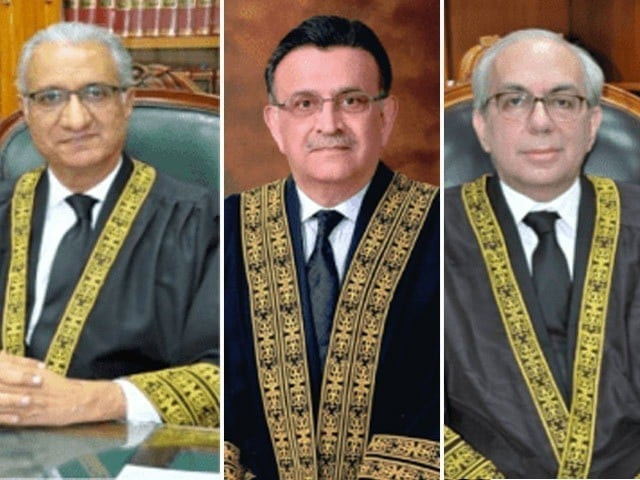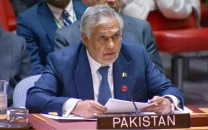Apex court strikes down review of judgments act
51-page judgement says law beyond legislative competence of parliament

The Supreme Court on Friday struck down as unconstitutional a piece of legislation that sought to widen the scope of review jurisdiction in cases decided under Article 184(3).
“The Supreme Court (Review of Judgments and Orders) Act 2023 is ultra vires of the Constitution being beyond the legislative competence of parliament,” declared a three-member bench headed by Chief Justice Umar Ata Bandial and comprising Justice Ijazul Ahsan and Justice Munib Akhtar.
“The petitions are maintainable for the purposes of Article 184(3) of the Constitution; (ii) the Supreme Court (Review of Judgements and Orders) Act, 2023, is repugnant to and ultra vires [of] the Constitution of the Islamic Republic of Pakistan, 1973, being beyond the legislative competence of parliament. It is accordingly struck down as null and void and of no legal effect," says the 51-page judgement authored by Justice Ijazul Ahsan.
Earlier on June 18, the bench had reserved the judgment on the petition challenging the law.
Interestingly, the judgment is announced after a day of the dissolution of the National Assembly. Senior lawyers have raised serious questions over the timing of the verdict wherein parliament has been given no opportunity to reconsider the new legislation on the same subject.
The court says that the question which needs to be examined is whether the legislature can, by way of ordinary legislation, override the rules framed by the Supreme Court of Pakistan in exercise of express powers available to it under Article 188 of the Constitution and overturn consistent judicial pronouncements embodying the contours and limits of Article 188 of the 1973 Constitution and in doing so, for all intents and purposes, create a right of appeal by indirectly amending Article 188 of the Constitution through ordinary legislation?
The judgement notes that the 2023 Act appears to be an overt and glaring intrusion in the independence of the judiciary. "The very preamble of the 1973 Constitution categorically states: … the independence of the judiciary shall be fully secured”.
Any legislation interfering with the independence of the judiciary, would by its nature and from its very inception, be unconstitutional, null, void and of no legal effect.
"We are clear in our minds that since independence of the judiciary is a recognised salient feature of the 1973 Constitution and provisions of the 2023 Act prima facie appears to affect such independence, the instant petitions raise questions of public importance within the contemplation of Article 184(3)of the Constitution.
“Further, any intrusion by any organ of the state in independence of the judiciary affects every citizen of the country and is, therefore, a question of great public importance."
The court held that parliament was not competent to legislate with respect to Article 188 in the manner that it has done by way of the 2023 act.
"Where such rule making power has been exercised by the court, any legislation by placing reliance on Entry 55 under the garb of “enlargement of jurisdiction of the Supreme Court” is indisputably unconstitutional and an intrusion in the independence of the judiciary specifically so where a right of appeal is sought to be provided when none has been provided by the Constitution.
“The so-called “enlargement” has no constitutional sanction or basis and is not anchored in any provision of the 1973 Constitution relating to the judicature or the Supreme Court of Pakistan."
"We also note that Section 2 conflates Appellate jurisdiction of the Supreme Court with that of review jurisdiction under Article 188 and thereby renders Article 188 to the extent of orders/judgments passed under Article 184(3) redundant by providing an appeal for all intents and purposes under the facade of review.
This appears to be an attempt to remodel the Constitutional scheme relating to judicature and potentially opening the door for diminishing, undermining and eroding the power and jurisdiction of the apex court of the country.
“Under the Constitution, orders and judgements passed by the Supreme Court under Article 184(3) are final except to the limited extent that the same may be subject to review jurisdiction under Article 188.
Section 2 by providing an appeal on facts and law against the judgements and orders passed under Article 184(3), reduces rather than enlarges the jurisdiction of the Supreme Court under Article 184(3) since such judgements and orders are now subject to a re-hearing and re-appraisal by a larger bench hearing the review as an appeal thereby destroying the finality of such judgments or orders.
“It may be noted that looked at from another angle, an “expansion” of review jurisdiction and converting it into an appeal would necessitate amending various Constitutional articles (including articles 184(3), 185 and 188) as well as modification of the 1980 Rules.
The 2023 Act alone, and by itself, cannot alter, modify or amend the constitutional provisions without adhering to the mandatory requirements set forth in Articles 238, 239 and 269 of the 1973 Constitution.”
The court also noted that the 1980 Rules were made pursuant to Article 191 (the Rule making power of this Court) and on a higher pedestal than ordinary legislation. "The same cannot be changed, modified, amended or altogether displaced by ordinary legislation being beyond the legislative competence of the legislature."
"With reference to Section 3 that review petitions are not petitions seeking leave to appeal in terms of Article 185(3), they are dealt with Order XIII and XVII of the 1980 Rules. Once all the formalities prescribed in the Rules are met, the matter is placed before a Bench constituted by the Chief Justice of Pakistan in terms of Order XI of the 1980 Rules.
"The question whether the legislature can enact a law on the subject of the constitution of benches has to be answered in the negative."
"Since this court has declared that under the 1980 Rules, it is the sole prerogative of the Chief Justice of Pakistan to constitute Benches, to fix the number of Judges who constitute the said Benches, it would veer towards irrationality to hold that while the original exercise and invocation of jurisdiction under Article 184(3) is the sole prerogative of the Chief Justice under the 1980 Rules, the legislature has the authority to supersede the Chief Justice and enact a law taking away the prerogative of the Chief Justice of nominating and fixing the number Judges to hear a review petition.
"The power to constitute benches has always vested with the judicial branch of the State and to suggest that the legislature can legislate on the issue of the mode and manner of composition and strength of benches to hear certain matters (in this case review petitions), would be a gross intrusion and incursion in judicial exercise of powers under the Constitution.
“Therefore, the said section violates the express command of the 1973 Constitution. We also find that Sections 2 and 3 of the 2023 Act go against the basic principle of separation of powers and offend against inter alia Articles 175(2), 175(3), 184(3), 185 and 188 of the 1973 Constitution by unduly intruding into and interfering with the independence of the judiciary, and therefore, diminish the mandate of this Court to protect and enforce the fundamental rights of the people of Pakistan."
The court held that “Section 2 of the 2023 Act, which is the heart of the 2023 Act, is ultra vires the Constitution, the entire super structure built on it in the form of sections 3, 4, 5, 6 & 7 are destined to fall to the ground”.
“It is a settled principle of law that if the gist of the Act and its very basis is declared to be unconstitutional then the ancillary provisions too must go as those cannot stand alone.
"Parliament is deemed to have passed those ancillary provisions on the assumption that the main gist or life of the act, namely that the review be converted into an appeal before a larger bench, is valid.
If Section 2 is declared to be unconstitutional and void then the remaining sections of the Act cannot stand on their own and the entire Act ought to be declared void."
“The power of striking down laws, has to be exercised with a great deal of care and caution. A law should not be struck down unless no alternate interpretation is available that can harmonize the Statute with the provisions of the Constitution. We have carefully examined the 2023 Act and placed it next to the Constitution as well as applied the settled principles for discharging the solemn duty of whether or not to declare the 2023 Act unconstitutional."
"However, despite our earnest effort to harmonize the Act with the provisions of the Constitution, we have concluded that 2023 Act is so patently, manifestly and irretrievably in conflict with and violative of various Articles of the 1973 Constitution that it is not possible to harmonise the two in any manner whatsoever."
Legal opinion
Commenting on the judgement, Abdul Moiz Jafferi advocate noted that the Supreme Court has completely disregarded the vacuum that the law aimed to address and fill.
"This is a problem of the court’s own creation,” he observed and pointed out that the court had placed its own rule-making power above legislation because it is drawn from the constitution, ignoring how the same article granting this power subjects it to ordinary law making, like the one at hand.
“It makes the entire enlargement attempt about an impingement upon judicial independence,” he added.
He stated that this was a defensive judgement where the court was more concerned with protecting its territory. However, what came across also is that the court was not as concerned about the health of its territory and how it has remained untended by the court itself, he said.
Jafferi further said that the judgment spoke of the finality of court orders whilst disregarding the extraordinary nature of 184(3) orders being without effective appellate remedy.
"The judgement disregards that the rules came about at a time when the use of the suo motu jurisdiction was nothing like it is today."



















COMMENTS
Comments are moderated and generally will be posted if they are on-topic and not abusive.
For more information, please see our Comments FAQ